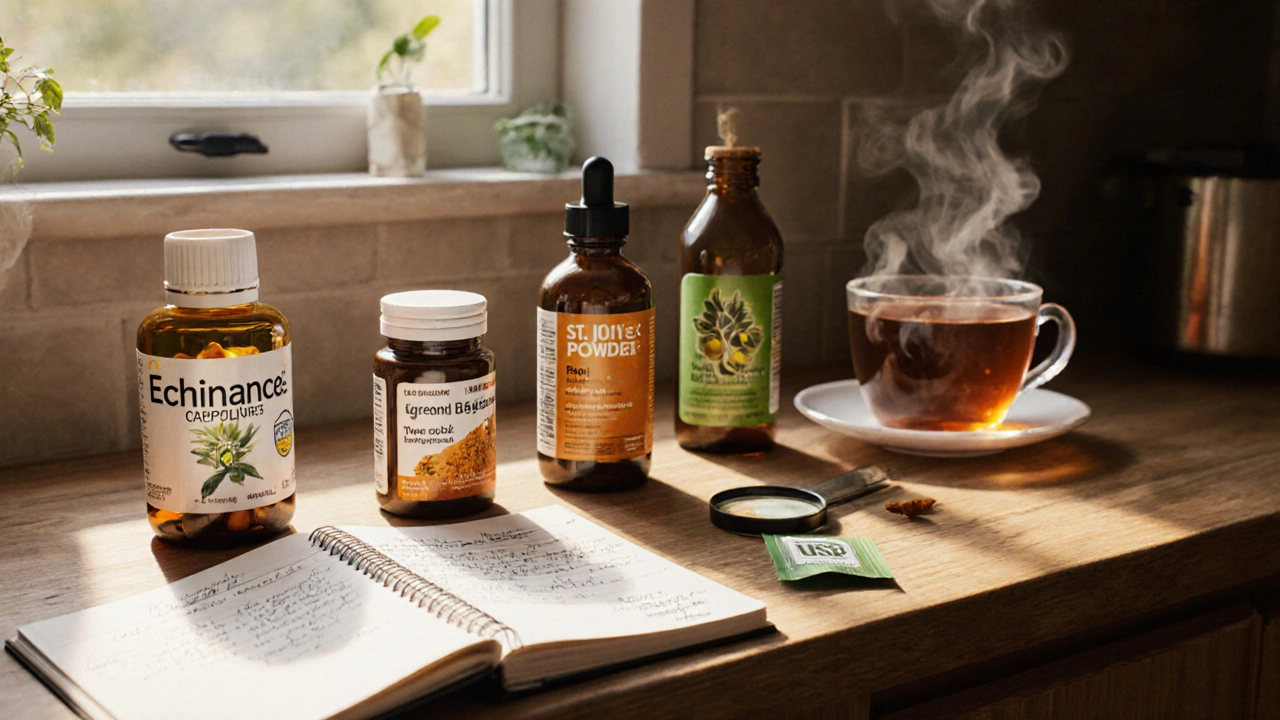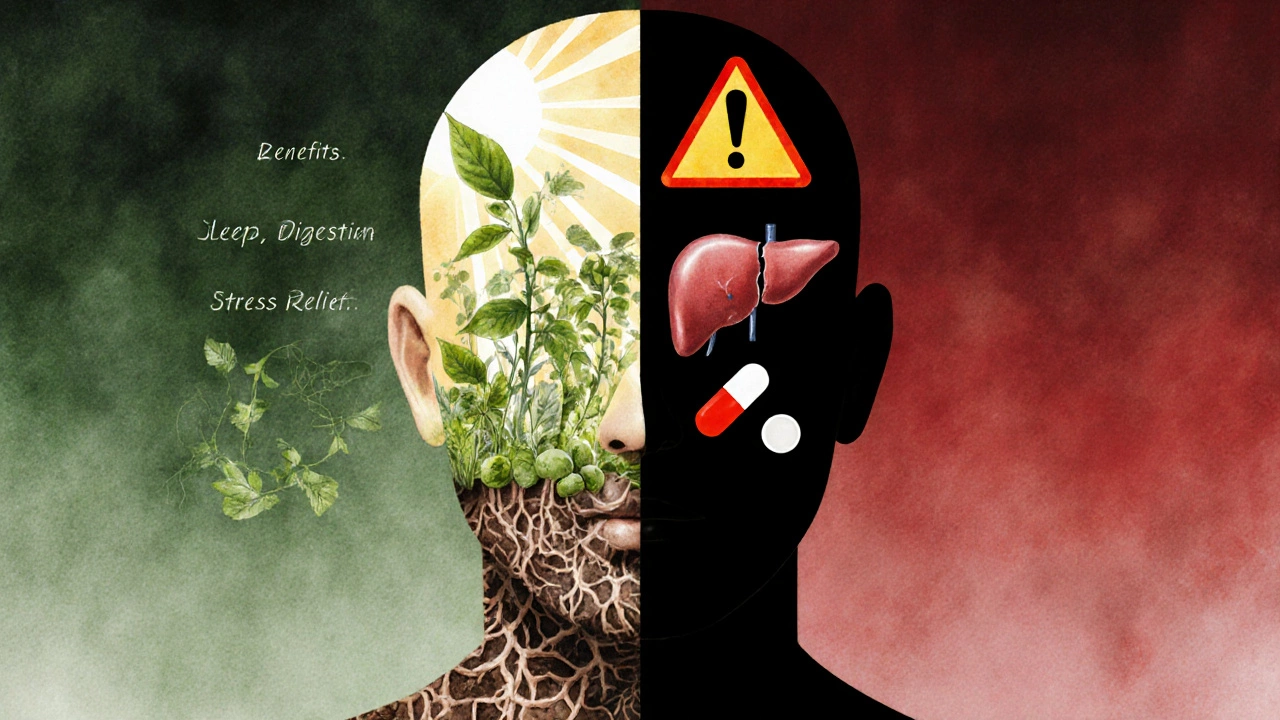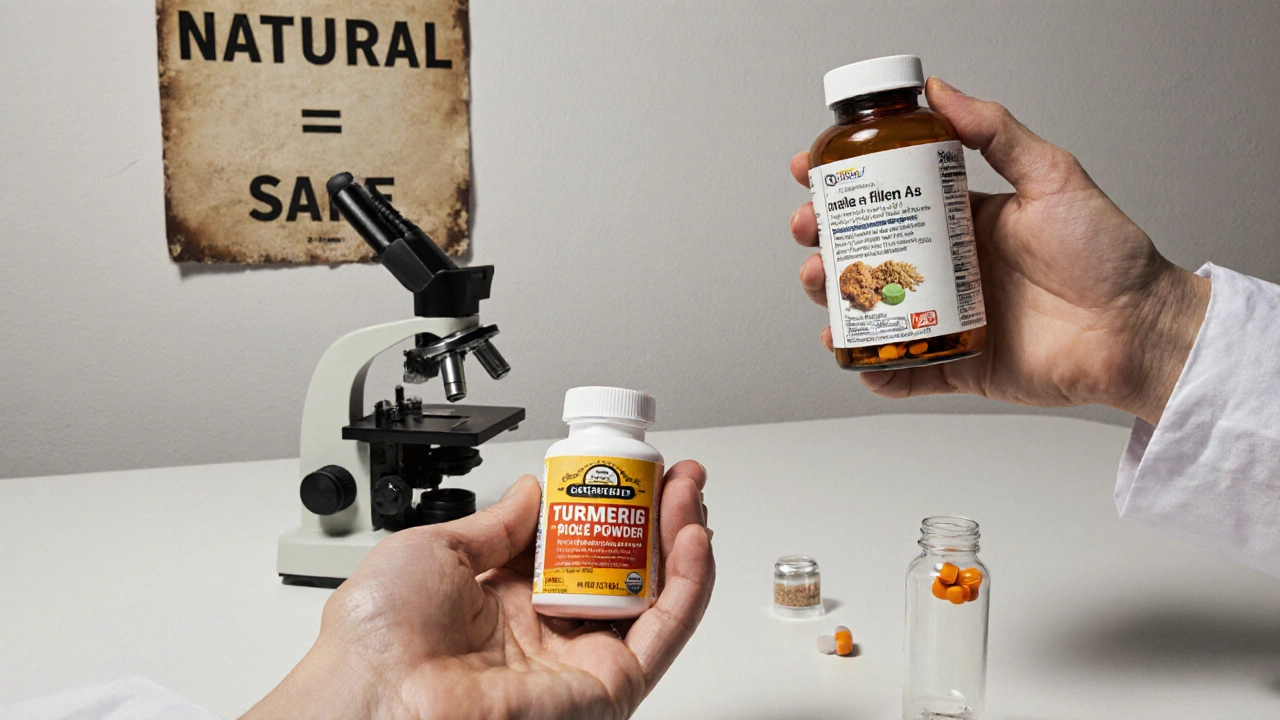What Are Herbal Health Supplements? A Clear Guide to Uses, Risks, and What Really Works
 Nov, 18 2025
Nov, 18 2025
Herbal Supplement Safety Checker
Check Your Supplement Safety
This tool helps you understand potential risks when taking herbal supplements with medications or health conditions. Always consult your healthcare provider before using supplements.
Herbal health supplements are products made from plants or plant parts-like leaves, roots, flowers, or seeds-that people take to support their health. They come in many forms: capsules, teas, tinctures, powders, and even topical creams. Unlike prescription drugs, they’re not meant to cure diseases. Instead, they’re used to help the body maintain balance, boost energy, ease discomfort, or support everyday wellness. But here’s the thing: not all herbal supplements are safe, and not all claims are backed by science.
What’s actually in herbal health supplements?
These products contain active compounds from plants that have biological effects on the body. For example, echinacea contains alkamides and polysaccharides that may stimulate immune cells. Turmeric’s main ingredient, curcumin, has anti-inflammatory properties shown in clinical trials to reduce joint pain. St. John’s wort has hypericin and hyperforin, which affect brain chemicals linked to mood.
But what’s on the label isn’t always what’s inside. A 2023 study by the U.S. Pharmacopeia found that nearly 1 in 5 herbal supplements didn’t contain the herb listed on the bottle. Some had fillers like rice powder or wheat. Others had unlisted pharmaceuticals-like hidden weight-loss drugs or sedatives-added to make them seem more effective. That’s why buying from trusted brands matters.
Why do people use them?
People turn to herbal supplements for reasons you’ve probably heard before: they want something natural, they distrust pharmaceuticals, or they’ve had bad side effects from prescription meds. But the real drivers are more personal. Someone with chronic back pain might try ginger extract after seeing a friend swear by it. A new mom might take fenugreek to increase milk supply. An older adult might use ginkgo biloba hoping to improve memory.
It’s not just about symptoms. Many use herbal supplements as part of a daily ritual-like drinking green tea for antioxidants or taking ashwagandha to manage stress. These habits often come from cultural traditions, family advice, or wellness influencers. But tradition doesn’t equal proof. Just because something’s been used for centuries doesn’t mean it’s safe or effective for everyone today.
What do they actually do? The science behind the claims
Some herbal supplements have solid research behind them. Others? Not so much.
- Valerian root has been shown in multiple studies to help with mild insomnia. One 2021 meta-analysis found it improved sleep quality without the grogginess common with sleep meds.
- Peppermint oil capsules are FDA-approved for treating IBS symptoms. They work by relaxing gut muscles, reducing bloating and cramping.
- Garlic supplements can lower blood pressure slightly-about 5-10 mmHg-in people with hypertension, according to a 2022 review in the Journal of Nutrition.
- Green tea extract contains catechins that may boost metabolism slightly, but the weight loss effect is small and often disappears after stopping use.
On the other hand, supplements like colloidal silver (marketed as an immune booster) or comfrey (used for bruises) have no proven benefits and carry real risks. Colloidal silver can turn your skin blue permanently. Comfrey contains liver-toxic compounds and is banned in many countries for internal use.

Are herbal supplements regulated like drugs?
No. In the U.S., the FDA treats herbal supplements as food, not medicine. That means companies don’t have to prove they work before selling them. They only have to prove they’re safe after harm occurs. Labels can say things like “supports immune health” or “promotes relaxation,” but they can’t claim to treat, cure, or prevent diseases.
This loophole lets bad actors sell ineffective or dangerous products. A supplement labeled “natural” doesn’t mean it’s safe. “Organic” only refers to how the plant was grown, not its potency or purity. And “standardized” sounds reassuring-but it just means the manufacturer tried to keep the active ingredient level consistent. It doesn’t guarantee effectiveness.
Other countries have stricter rules. In Germany, herbal products called “phytomedicines” are regulated like drugs. In China, traditional herbal formulas are part of the national healthcare system and require clinical testing. But in the U.S. and many other places, it’s buyer beware.
What are the biggest risks?
The biggest danger isn’t usually the herb itself-it’s what happens when it mixes with other things.
- St. John’s wort can make birth control pills, blood thinners, antidepressants, and even some cancer drugs useless. It’s one of the most dangerous herb-drug interactions.
- Ginkgo biloba increases bleeding risk. If you’re taking aspirin or planning surgery, it can cause dangerous bleeding.
- Black cohosh has been linked to liver damage in rare cases, especially with long-term use.
- Kava was pulled from shelves in Europe and Canada because of liver toxicity reports.
Even “safe” herbs can cause problems. Licorice root can raise blood pressure. Ginseng can cause insomnia or heart palpitations. And if you’re pregnant, breastfeeding, or have a chronic condition like kidney disease or diabetes, some herbs can be harmful.

How to choose safer herbal supplements
If you’re going to use them, here’s how to cut through the noise:
- Look for third-party testing-certifications like USP, NSF, or ConsumerLab mean the product was independently checked for ingredients, purity, and strength.
- Check the dose-many supplements contain too little of the active ingredient to matter. For example, turmeric supplements should have at least 500 mg of curcumin per serving, ideally with piperine to boost absorption.
- Read the full ingredient list-avoid products with “proprietary blends” that hide how much of each herb is included.
- Ask your doctor or pharmacist-especially if you take any prescription meds. Even over-the-counter herbs can interfere.
- Start low, go slow-try one herb at a time. Give it 4-6 weeks before deciding if it works.
When not to use herbal supplements
There are times when skipping them is the smartest choice:
- You’re pregnant or breastfeeding-many herbs cross the placenta or enter breast milk.
- You’re scheduled for surgery-stop all herbal supplements at least two weeks before.
- You’re treating a serious condition like cancer, heart disease, or diabetes-herbs aren’t replacements for proven medical care.
- You’re using them to avoid seeing a doctor-delaying diagnosis can be life-threatening.
Herbal supplements aren’t evil. But they’re not magic either. They’re powerful plant chemicals. Treat them like medicine, not candy.
What’s the bottom line?
Herbal health supplements can help some people with specific issues-like sleep, digestion, or mild stress. But they’re not a cure-all, and they’re not risk-free. The most effective ones have real science behind them. The most dangerous ones are the ones you assume are harmless because they’re “natural.”
If you want to try one, pick a well-researched herb, buy from a reputable brand, talk to your healthcare provider, and keep track of how you feel. If something doesn’t work after a few weeks, stop. If you feel worse, stop immediately.
There’s no shortcut to health. But with the right info, herbal supplements can be a small, safe part of a bigger plan-not the whole plan.
Are herbal health supplements FDA approved?
No, herbal health supplements are not FDA approved as drugs. The FDA doesn’t review them for safety or effectiveness before they’re sold. Instead, they’re regulated as dietary supplements, which means the manufacturer is responsible for ensuring safety, but the FDA only steps in if there’s a report of harm after the product is on the market.
Can herbal supplements interact with prescription medications?
Yes, many can. St. John’s wort can make birth control, antidepressants, and blood thinners ineffective. Ginkgo biloba increases bleeding risk when taken with aspirin or warfarin. Garlic and ginger supplements can also thin the blood. Always tell your doctor what herbs you’re taking-especially before surgery or if you’re on chronic medication.
Do herbal supplements really work for weight loss?
Most don’t. Supplements like green tea extract or Garcinia cambogia may cause tiny, temporary boosts in metabolism, but studies show the actual weight loss is minimal-often less than 2 pounds over several months. Many weight-loss herbs contain hidden stimulants or diuretics that can be dangerous. Sustainable weight loss comes from diet, movement, and sleep-not pills.
How do I know if a herbal supplement is high quality?
Look for third-party testing seals like USP, NSF, or ConsumerLab. These mean the product was tested for the right ingredients, correct dosage, and absence of contaminants like heavy metals or pesticides. Avoid products with “proprietary blends” that hide ingredient amounts. Buy from brands that list their manufacturing location and provide batch test results online.
Is it safe to take herbal supplements during pregnancy?
Many are not. Herbs like black cohosh, dong quai, and goldenseal can stimulate uterine contractions and may increase miscarriage risk. Even common herbs like chamomile and peppermint in large amounts aren’t recommended without medical advice. Always consult your OB-GYN before taking any herbal product while pregnant or breastfeeding.
Can herbal supplements replace prescription drugs?
No. Herbal supplements are not substitutes for proven medical treatments for conditions like high blood pressure, diabetes, depression, or heart disease. While some may help manage mild symptoms, stopping prescribed medication for an unproven herbal alternative can lead to serious health consequences. Always work with your doctor before making any changes to your treatment plan.